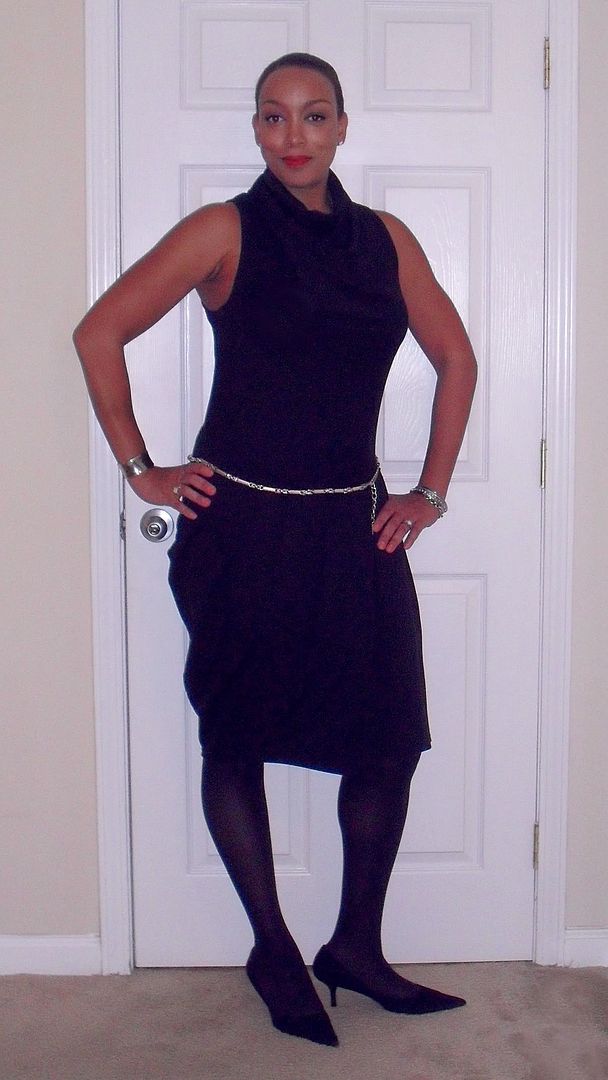
Project Details:
Pattern: Vogue 1119 - Donna Karan Collection
Fabric: Black Ponteroma Knit from Hancock Fabrics (72% Polyester; 24% Rayon and 4% Spandex)
Description: Semi-fitted dress has cowl collar, pleated and darted skirt, raw edges. Wrong side of fabric will show*.'
Fabric: Black Ponteroma Knit from Hancock Fabrics (72% Polyester; 24% Rayon and 4% Spandex)
Description: Semi-fitted dress has cowl collar, pleated and darted skirt, raw edges. Wrong side of fabric will show*.'
Pattern Sizing: 6 - 20. I cut the size 16, to insure that I would have adequate ease for draping... which is the essential design element of this pattern.
Did it look like the photo/drawing on the pattern envelope once you were done sewing with it? Yes, it does!
Were the instructions easy to follow? The instructions were easy enough that a beginner could handle this project with ease. I went from cutting the fabric, to muslin to finished garment in a day. Keep in mind, that's all I did that day, LOL!
What did you particularly like or dislike about the pattern? I always love the "designer patterns". I love that this dress, was plucked right off of the runway. It was in the Donna Karan Fall 2008 RTW Collection:
Did it look like the photo/drawing on the pattern envelope once you were done sewing with it? Yes, it does!
Were the instructions easy to follow? The instructions were easy enough that a beginner could handle this project with ease. I went from cutting the fabric, to muslin to finished garment in a day. Keep in mind, that's all I did that day, LOL!
What did you particularly like or dislike about the pattern? I always love the "designer patterns". I love that this dress, was plucked right off of the runway. It was in the Donna Karan Fall 2008 RTW Collection:
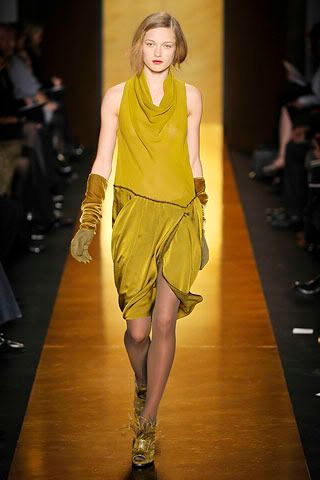
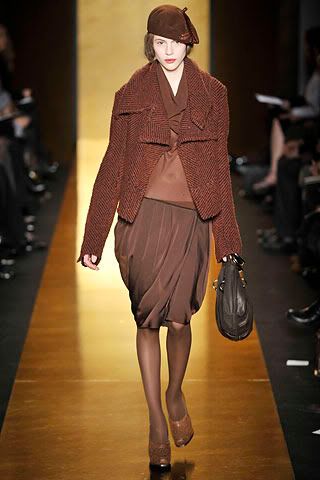

This style also emphasized one of the hottest trends this season -- draping. I love that the style of this dress has minimal draping and could be made in a fabric that was appropriate for daytime.
Pattern Alterations or any design changes you made: When I open a pattern up, the first thing I do is flat pattern measurements. I very rarely make a FBA on knits with moderate stretch and according to the finish measurement, there was enough ease (for me). The design of the skirt was "interesting" to say the least. I always assume that I will need to lengthen everything, because I usually always have to. There was no alteration line on the skirt part of the dress. And the hemline left me confused, so I made a muslin. And on this rare occasion, NO alterations were necessary.
NOTE: Ladies shorter than 5'9", be aware of where you want the hemline to land. Mine hits in the same place as the model on the pattern envelope.
Instead of staystitching, I stabilized using clear elastic for the neckline and shoulder seams. Also, instead of using seam binding, I just made a 5/8" hem on the skirt edge and hem. I also did this at the armholes. I left the neckline unfinished. *When I wear it, I'll just turn it to the inside because I don't want the seam to show on the outside.
What I didn't like:
On the skirt, the markings seem to be misplaced. Where they suggest the center back and center front should be, was askew. Also, the instructions suggested that the skirt be attached to the top by an indicated square... when there was a perfectly good side seam. I tried it their way by basting the skirt to the top. The back darts were askew and the skirt didn't hang correctly. When I made my correction by lining up the right side seam of the skirt to the side seam of the top, everything else matched up accordingly.
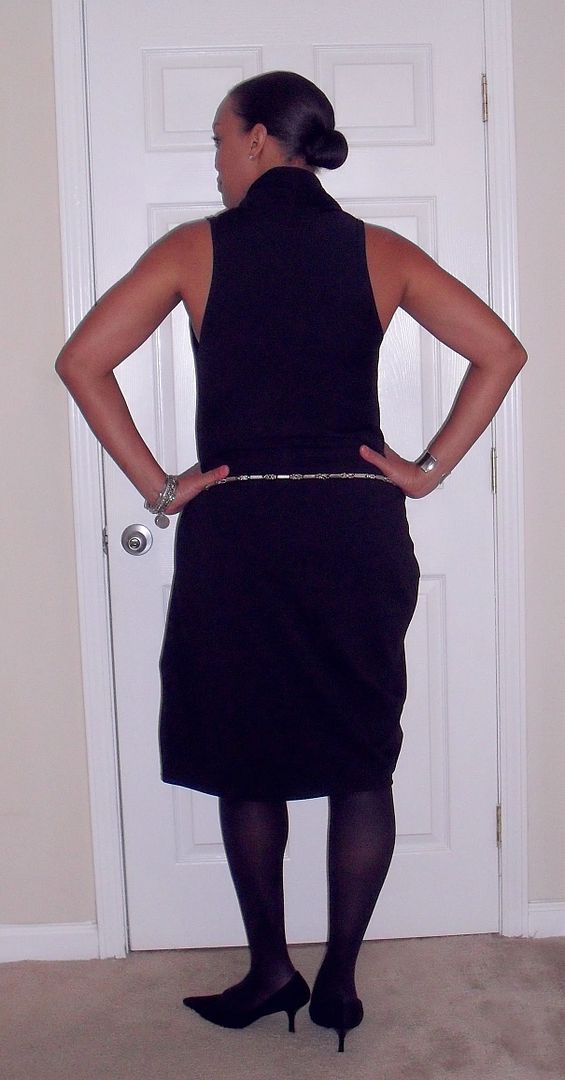
Would you sew it again? Would you recommend it to others? No, because it's such a unique style, I only need one. If you like something a little more "edgy" and this is your style, it's a quick and (Vogue) easy project.
Pattern Alterations or any design changes you made: When I open a pattern up, the first thing I do is flat pattern measurements. I very rarely make a FBA on knits with moderate stretch and according to the finish measurement, there was enough ease (for me). The design of the skirt was "interesting" to say the least. I always assume that I will need to lengthen everything, because I usually always have to. There was no alteration line on the skirt part of the dress. And the hemline left me confused, so I made a muslin. And on this rare occasion, NO alterations were necessary.
NOTE: Ladies shorter than 5'9", be aware of where you want the hemline to land. Mine hits in the same place as the model on the pattern envelope.
Instead of staystitching, I stabilized using clear elastic for the neckline and shoulder seams. Also, instead of using seam binding, I just made a 5/8" hem on the skirt edge and hem. I also did this at the armholes. I left the neckline unfinished. *When I wear it, I'll just turn it to the inside because I don't want the seam to show on the outside.
What I didn't like:
On the skirt, the markings seem to be misplaced. Where they suggest the center back and center front should be, was askew. Also, the instructions suggested that the skirt be attached to the top by an indicated square... when there was a perfectly good side seam. I tried it their way by basting the skirt to the top. The back darts were askew and the skirt didn't hang correctly. When I made my correction by lining up the right side seam of the skirt to the side seam of the top, everything else matched up accordingly.

Would you sew it again? Would you recommend it to others? No, because it's such a unique style, I only need one. If you like something a little more "edgy" and this is your style, it's a quick and (Vogue) easy project.


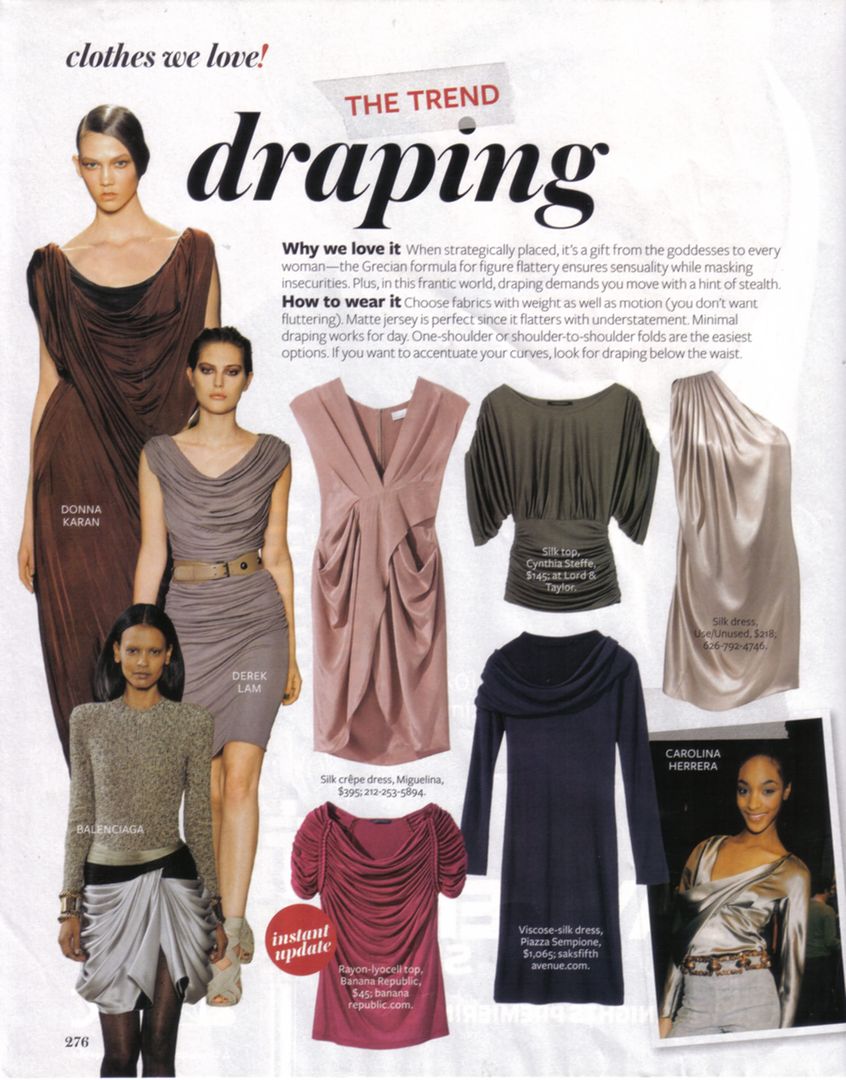
No comments:
Post a Comment